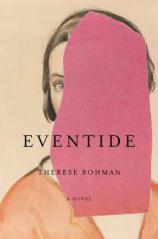Eventide
Review
Eventide
As you delve into Therese Bohman’s EVENTIDE, you begin to understand its main character, Karolina Andersson, very gradually. Her life as an art history professor at Stockholm University and the preceding events are told in snapshots, mainly through her own recollections that seem to describe the life of a woman who believes she is in ruin. In her mid-40s, she is childless, lives alone and has recently ended a long relationship with a man named Karl Johan.
During one such instance, Karolina recalls a time when she believed she was pregnant with Karl’s child. It filled her with hope, not panic. In the mirror, she saw herself glow and imagined she was expecting. However, she tells no one of the possible pregnancy for two reasons: speaking it would cause the fates to intervene and her self-love to turn to doubt, and keeping the secret to herself --- even withholding it from her own husband --- is a form of pleasure.
It speaks to Karolina’s juxtaposition. She is intelligent and stable, yet insecure and sees herself as broken. She is a hopeless romantic, an idealist and a believer in the beauty of art, yet she is ordinary, and spends time reading her colleagues’ social media posts and drinking wine. She is a dreamer, always in search of a lover and infatuated by the taboo. As a result, EVENTIDE is a rather subdued yet erotic novel. With beautiful restraint, it conveys the broken identity of a middle-aged woman who, despite achieving acclaim in the art circles, would just as likely reject the culture as a form of self-satisfaction.
"...a rather subdued yet erotic novel. With beautiful restraint, it conveys the broken identity of a middle-aged woman who, despite achieving acclaim in the art circles, would just as likely reject the culture as a form of self-satisfaction."
Karolina displays precisely this during a book release party for a colleague, Lennart Olsson. It becomes apparent that the culture around this world is a facade and, like the novel itself, is more about the sexual undertones that stir its characters to pursue their careers. Karolina ends up at an after-party with her PhD student, Anton Stromberg, along with Lennart and a woman named Moa. Karolina begins to have visions of where things may turn. As if reading her mind, Moa suggests a game of truth or dare. While seeing it as childish, Karolina is intrigued nevertheless. However, when it becomes apparent that she will not kiss the student to whom she’s attracted, but rather Lennart, toward whom she feels antipathy and revulsion, she abruptly leaves, dismissing it as nothing more than “teenage idiocy.”
A lesser novel may not have shown the same restraint. Karolina could see the party turning into an orgy. It’s possible at that point that her attraction to the taboo may lead her to partake, but there’s another layer at play here when you realize that doing so may actually be the convention. Abruptly leaving is another way of Karolina doing the opposite of what is expected. Sure, her disgust with Lennart is partly why she does this, but the fact that the act would be a defiance in itself is why she makes her choice.
EVENTIDE very easily could be called a feminist novel. In the conventional sense it may be, in that it seeks equality, but a feminist label may be selling it short. Consider a scene during the book release party where Karolina gets into an argument with Lennart over her student’s PhD dissertation on a long-lost artist named Ebba Ellis. Her colleague argues that we have much to learn about forgotten female artists. Karolina counters by saying, “This is not so much a question of forgotten female artists among many others, but a completely unknown artist period.”
Karolina’s point is that making females the exception and not the status quo ultimately undermines gender equality. In her view, equality means that Ebba Ellis is not a female artist. She is an artist first and then a female. In a larger sense, it is this tension that shapes her world and her experiences throughout EVENTIDE.
Karolina becomes a fascinating woman to get to know. For a long time, there is very little movement in the overall plot. For the most part, things stem from her own recollections, but to Bohman’s credit, she piques interest in the right ways when not much seems to happen plotwise. Examples include Karolina’s first meeting with the supremely confident Anton, where she gets a hint of “something sweet,” and when she asks Peter Tallfalk, a happily married man, why they couldn’t have ended up together. These moments seem to rise not quite out of nowhere, but rather as a culmination of the mundane that is suddenly flipped on its head in beautiful contradiction to the ordinary series of events that preceded them.
It all leads to a question that readers will ask themselves throughout the book: Who is Karolina Andersson? We know her qualities and habits, but her identity is remarkably absent. While dating Karl, she begins an affair with a married man, a plain but handsome architect named Anders. He opens up to her about the death of his mother and cannot help but sob. Karolina listens and asks him to tell her more. She is moved and feels close to him. But she herself never opens up to him or, for that matter, anyone else. That, ultimately, is what EVENTIDE is all about --- the portrait of a person who is irrevocably damaged and perhaps permanently closed to the world, yet is always longing for deep and impactful intimacy wherever it may stir.
Reviewed by Stephen Febick on May 18, 2018
Eventide
- Publication Date: April 10, 2018
- Genres: Fiction
- Paperback: 208 pages
- Publisher: Other Press
- ISBN-10: 1590518934
- ISBN-13: 9781590518939










